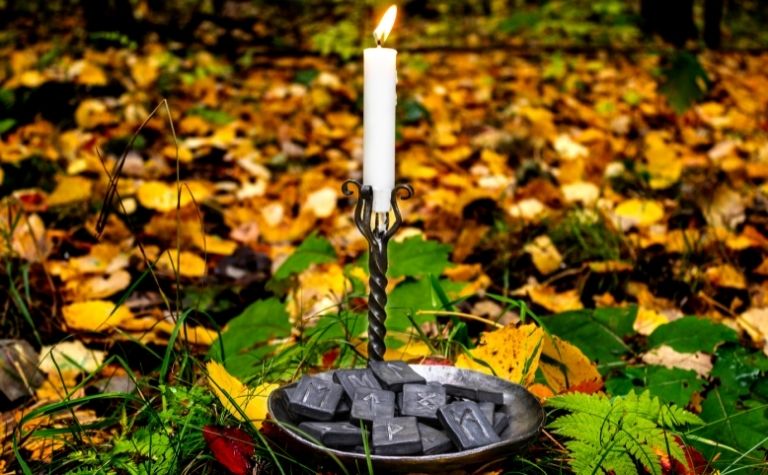Whether people enjoy reading and studying Norse mythology or not, most of them have at least heard of it because it’s so old.
After all, people were worshipping Odin, Thor, and the other Aesir over 1,000 years ago. But is the Norse religion older than Judaism?
The Norse religion is not older than Judaism, though it does predate Christianity. Judaism, or the faith of the ancient Hebrews, began nearly 4,000 years ago, before the birth of Christ.
The Vikings didn’t start telling stories about the Aesir until about the 2nd century A.D.
This article will explore the origin of both Judaism and the Norse religion. It will also examine some of the key differences between the two faiths.
Also, see Is the Norse Religion Older Than Christianity? to learn more.

When Did the Norse Religion Start?
Belief in the Norse gods, or Norse Paganism, dates back to the 2nd Century A.D., although any written accounts scholars have concerning the Norse gods stem from much later. [1]
The most prominent period of Norse paganism aligns with the Viking age from 800 to 1050 A.D. [2]
Vikings are most often associated with Norse paganism, but people worshipped the Norse deities long before anyone ever called the people from Scandinavia ‘Vikings.’
Most of the information scholars have about the Norse gods and how the faith was practiced comes from The Poetic Edda, probably written sometime in the 13th century, and the uncovered ruins of gravesites and temples.
However, they’re confident that people adhered to Norse pagan beliefs as early as the 2nd century.

When Did Judaism Start?
By contrast, however, Judaism appeared nearly 2,000 years before people were worshipping the Norse deities.
The start of Judaism was in the 17th century B.C. with the tales of Abraham, Isaac, and Jacob. [3]
This was the period when the Jews settled in Israel until a harsh famine forced them out and into Egypt.
This account and the events that followed are recorded in the books of Genesis and Exodus.
Scholars believe those two books of the Bible are some of the oldest ever written.
However, even though they are the first two books in the Bible, they probably weren’t the first written. Instead, historians believe the Book of Job was likely written first.
Also, see Why Did the Norse Religion Die Out? to learn more.

Norse Religion vs. Judaism: Key Differences
There are several key differences between Norse paganism and Judaism, but the most prominent one is that the Norse religion is polytheistic, while Judaism is monotheistic.
Although there’s some dispute, Judaism is considered by some to be the oldest monotheistic religion in the world [4].
The following several sections will explore this difference and others between the two religious beliefs.
Monotheism vs. Polytheism
Monotheism is the belief in a single god. Mostly, this single god is omnipotent and omnipresent. He is all-powerful, and everything in the universe comes from him.
Polytheism, on the other hand, is the belief in many gods. As is the case with Odin, there may be one god in the pantheon that is more powerful than the others, but all the gods are powerful, particularly within their own areas.
For example, in Greek mythology, another polytheistic religion, Zeus was the most powerful of all the gods. However, his brother Poseidon was much more powerful within his limited scope of the sea.
Worshippers of Norse paganism worshipped and sacrificed to Odin, Thor, Frey, Freya, Tyr, and others. There were many gods; some were feared, while others were loved. However, people believed in them all.
Polytheistic religions often have more than just gods, as well. They also have demigods, which are the offspring of their gods and humans.
Also, see Is the Norse Religion Still Practiced? to learn more.
Jesus Christ
Although Jesus Christ is a central figure in Christianity, not Judaism, he is worth mentioning here.
The idea of demigods has led several people to ask the question, “What about Jesus Christ?” Would he be considered a demigod, and would worshipping him mean Christianity is actually a polytheistic religion?
The answer varies depending on who you ask, but the church’s official stance on the matter is no, Jesus is not a demigod.
Jesus is part of the Holy Trinity in Christianity – the Father (God), the Son (Jesus), and the Holy Spirit.
However, all three of these beings are one; they are all God — the same god. Therefore, Christianity is still a monotheistic religion.
The (Im)Mortality of the Deity(ies)
Another critical difference between the Norse religion and Judaism stems from the mortality or immortality of the gods involved.
The god in Judaism is immortal; he was here before the beginning of recorded history, and he will be here long after the world ends. He cannot be hurt or harmed, nor does he age or grow sickly.
The Norse gods, though, could be injured, get sick, or even die. Tyr, the god of war, loses his hand to Fenris Wolf (Fenrir), and Baldr, the most beloved of the gods, dies when shot with a dart made of mistletoe.
Even Odin, the All-father and most powerful of the gods, will die at Ragnarok. Fenrir will kill him, and Odin’s son Vidar will avenge his father’s death by ripping Fenrir’s jaws apart.
According to the Norse myths, nearly all the gods will die at Ragnarok, which is vastly different from anything concerning the Hebrew god.
The Idea of Fate
The belief in fate is another point of disparity between the Norse religion and Judaism.
People who followed the Norse faith believed their fates were predetermined. That’s part of the reason Vikings were such fierce warriors.
They believed that the day of their death was determined from the moment they were born, and nothing they did would hasten or delay that.
The same is not true for followers of Judaism. Although some Christian denominations and sects believe in predestination, Jews do not. They think it’s people’s actions that determine their ultimate fates.
Conclusion
Judaism is older than the Norse religion by about 2000 years, and both are very different. Still, they’re interesting and worthy of more in-depth study.
Also see Do People Still Convert to the Norse Religion? to learn more.
